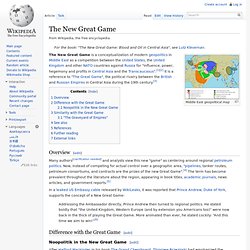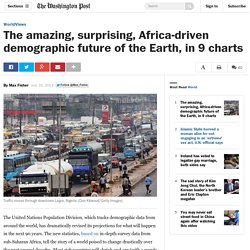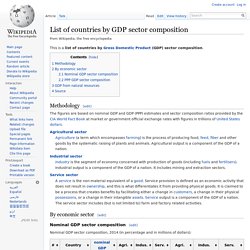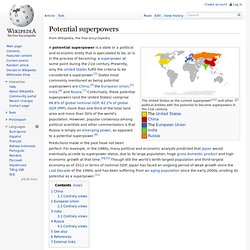

The New Great Game. Middle East geopolitical map The New Great Game is a conceptualization of modern geopolitics in Middle East as a competition between the United States, the United Kingdom and other NATO countries against Russia for "influence, power, hegemony and profits in Central Asia and the Transcaucasus".[1][2] It is a reference to "The Great Game", the political rivalry between the British and Russian Empires in Central Asia during the 19th century.[3] Overview[edit] Many authors[clarification needed] and analysts view this new "game" as centering around regional petroleum politics.

Now, instead of competing for actual control over a geographic area, "pipelines, tanker routes, petroleum consortiums, and contracts are the prizes of the new Great Game".[4] The term has become prevalent throughout the literature about the region, appearing in book titles, academic journals, news articles, and government reports.[5] Addressing the Ambassador directly, Prince Andrew then turned to regional politics. The amazing, surprising, Africa-driven demographic future of the Earth, in 9 charts. Traffic moves through downtown Lagos, Nigeria.

(Dan Kitwood/Getty Images) The United Nations Population Division, which tracks demographic data from around the world, has dramatically revised its projections for what will happen in the next 90 years. The new statistics, based on in-depth survey data from sub-Saharan Africa, tell the story of a world poised to change drastically over the next several decades. Most rich countries will shrink and age (with a couple of important exceptions), poorer countries will expand rapidly and, maybe most significant of all, Africa will see a population explosion nearly unprecedented in human history.
If these numbers turn out to be right – they're just projections and could change significantly under unforeseen circumstances – the world of 2100 will look very different than the world of today, with implications for everyone.
Countries by GDP sector. This is a list of countries by Gross Domestic Product (GDP) sector composition.

Methodology[edit] The figures are based on nominal GDP and GDP (PPP) estimates and sector composition ratios provided by the CIA World Fact Book at market or government official exchange rates with figures in trillions of United States dollars. Agricultural sector. The Genographic Project by National Geographic - Human Migration, Population Genetics.
Life in a Day. Healing the Grasslands, Rangelands and Savannas of the World. English Russia. Potential superpowers. The United States as the current superpower[1][2] and other political entities with the potential to become superpowers in the 21st century.

China[edit] Barry Buzan asserted in 2004 that "China certainly presents the most promising all-round profile" of a potential superpower.[22] Buzan claimed that "China is currently the most fashionable potential superpower and the one whose degree of alienation from the dominant international society makes it the most obvious political challenger. " However, he noted this challenge is constrained by the major challenges of development and by the fact that its rise could trigger a counter coalition of states in Asia. Parag Khanna stated in 2008 that by making massive trade and investment deals with Latin America and Africa, China had established its presence as a superpower along with the European Union and the United States. China's rise is demonstrated by its ballooning share of trade in its gross domestic product. Contrary views[edit] Robert J. List of buildings with 100 floors or more.
This is a list of buildings with 100 floors or more.

Completed buildings[edit] This list includes buildings whose construction is complete, or are topped-out. Buildings under construction[edit] This is a list of buildings under construction that are planned to have 100 floors or more. It does not include proposed, approved and topped-out buildings.[5]
A Point of View: The British and their bizarre view of Americans. We lap up their culture, adopt their economics and are obsessed with the "special relationship".

So why do British people have such a confused - even negative - view of Americans, asks writer Will Self. In 1976 my American mother took me to see Tom Stoppard's two short plays, Dirty Linen and New-Found-Land. 1 Second in Each Place. How to start a bonfire. News: Are We Living In The Last Days. Worldwonders. One Race, Every Medalist Ever - Interactive Graphic. The Seven Wonders of the World. Interactive Infographic of the World's Best Countries - Newsweek and The Daily Beast. 50 Important Landmarks. 'Ultraconserved Words' Have Persisted Since Ice Age. By Elizabeth Norton If you've ever cringed when your parents said "groovy," you'll know that spoken language can have a brief shelf life.

But frequently used words can persist for generations, even millennia, and similar sounds and meanings often turn up in very different languages. The existence of these shared words, or cognates, has led some linguists to suggest that seemingly unrelated language families can be traced back to a common ancestor. Now, a new statistical approach suggests that peoples from Alaska to Europe may share a linguistic forebear dating as far back as the end of the Ice Age, about 15,000 years ago.
"Historical linguists study language evolution using cognates the way biologists use genes," explains Mark Pagel, an evolutionary theorist at the University of Reading in the United Kingdom. Because words don't have DNA, researchers use cognates found in different languages today to reconstruct the ancestral "protowords. " Also on HuffPost: Under the Sea.
International Human Development Indicators - UNDP.